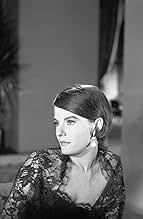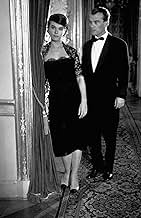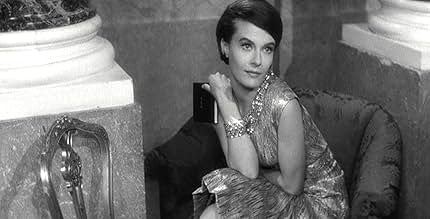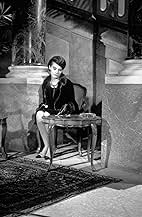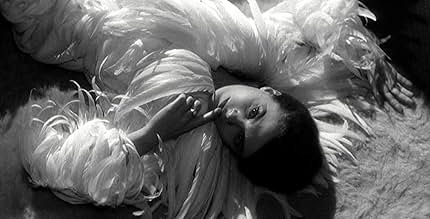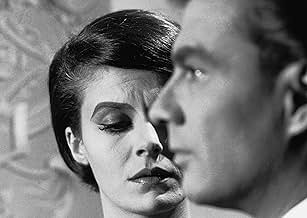ÉVALUATION IMDb
7,6/10
26 k
MA NOTE
Ajouter une intrigue dans votre langueIn a strange and isolated chateau, a man becomes acquainted with a woman and insists that they have met before.In a strange and isolated chateau, a man becomes acquainted with a woman and insists that they have met before.In a strange and isolated chateau, a man becomes acquainted with a woman and insists that they have met before.
- Nommé pour 1 oscar
- 2 victoires et 5 nominations au total
Karin Toeche-Mittler
- Un personnage de l'hôtel
- (as Karin Toche-Mittler)
Davide Montemurri
- Un personnage de l'hôtel
- (as Davide Montemuri)
Alan Edwards
- English Introduction
- (uncredited)
Avis en vedette
I am amazed by the plethora of negative comments surrounding this film. Having seen it for the first time recently I thought it one of the most creative representations of a Greek myth to date. It is the story of Orpheus, a hero who attempts to rescue his love from the underworld but must convince her to leave of her own free will. The film is set in a hotel and the surrounding gardens. The film is rich in symbolic imagery and the camera shots beautiful. The score leaves something to be desired but anyone who loves Greek mythology and good cinema should appreciate this film.
Scenes at a European spa unfold while a man's mind tries to recollect a love affair of the past season. In one of the most deeply psychological films I have seen, memory itself seems to be the protagonist -- or is it the villain? What plot there is simply provides the material for a meditation on the uncertainty of knowing. The accomplishment of _Last Year at Marienbad_ is to make this point convincingly even in the case of that which one would not expect a man to have difficulty remembering: a sexual involvement and loss. It does so by a hypnotic combination of wheeling, dreamlike images of the resort's architecture and grounds, together with the incantatory, obsessive, recurrent tone of the narrative voice over. In doing this it also transforms a place where people go to be waited on and to play, into a labyrinth haunted by unsmiling shades, where remembering is both impossible and necessary.
The title of Dali's best known work is an apt description of this film. A man meets a woman at a European spa and tries to convince her (and himself) that they met one year ago. While the plot is simple, its presentation is not. I first saw L'annee derniere a Marienbad while taking a French Film class in college. Of the dozen or so films we watched, Marienbad has stayed with me the longest. The nameless protagonist's memories repeat, sometimes minutely changed, sometimes not. The same organ motifs echo again and again, all against the backdrop of elegant hallways and sitting rooms. Through all this, the man attempts to spirit the woman away from her husband/companion, while at the same time establish once and for all what happened last year and what did not. More than any other film, Marienbad has shown me the difference between American film conventions and what else is possible. While so many American releases are rigidly plot driven, Marienbad uses film as a tool for exploration and introspection. Instead of linear story telling, director Resnais allows his characters to explore the details of what may be memory or just imagination. Against a detached, almost stoical background of extras and cool interiors, Delphin Seyrig and Giorgio Albertazzi display a sharp contrast of passion, pleading, and denial. I agree with a previous reviewer that much of the look of Marienbad has been appropriated by commercials for perfume; however, if you haven't seen this film before, you most likely have never seen anything quite so surreal.
Years come and go, but "Marienbad" seems to remain the same--intriguing, challenging, stimulating, and moving. Alain Resnais' classic emerges as a timeless work, with a memorable score (utilizing unique pipe organ music) by Francis Seyrig and striking photography by Sacha Vierny. Delphine Seyrig and Giorgio Albertazzi play out their "roles" amidst dark corridors, empty halls, baroque statuary and geometric gardens. Time seems to stand still in the world of Resnais and Alain Robbe-Grillet, as our rapt attention is focused on its distinctive unfoldment. The meaning seems to be in the work and the solution in the problem. We simply take it in and allow it to speak for itself.
"Marienbad" is one of those films which requires a full- size widescreen and an excellent print to weave its haunting magic. It's a one-of-a-kind film experience, and one to which one can return again and again to enjoy as a mystery, romance or meditation.
"Marienbad" is one of those films which requires a full- size widescreen and an excellent print to weave its haunting magic. It's a one-of-a-kind film experience, and one to which one can return again and again to enjoy as a mystery, romance or meditation.
It would take a braver person than me to delineate what LAST YEAR AT MARIENBAD is `about', but as it is such an entirely thought provoking film, perhaps some sort of `meaning' can come from sharing these thoughts about it. Many people define it as cerebral and classical, but to me it is romantic and gothic. What is remarkable about the setting and the characters is that they are all so wealthy that they can rise above the concerns of ordinary mortals, only to find that this advantaged life brings other problems - of identity, purpose and values. They are strangely existentialist - the existentialism of great wealth - their small talk is intelligent, informed and stilted; they are all beautiful in the sense that money can partly buy beauty, and yet, in the process, they have lost human warmth, real sexual desire, and any purpose in life other than to drift on in their station in life. But desire is a respecter of nobody, and it is this element of human nature that haunts the corridors of the hotel like an invisible mist, and subconsciously their acutely civilised life-style which has bereaved them of something they no longer acknowledge or recognise and have deeply repressed - only to find it lingers on the fringes, confusing and disturbing them - spoiling everything; a depressive dissatisfaction. There is no joy, no enjoyment. The gardens become symbols of this desire to enslave, conquer and exile nature - formal, rigid and planned, and yet within the hotel, all around are decorative symbols of the chaotic and random aspects of nature. Everything appears to carry a symbol that needs to be interpreted - if it is there, it must have meaning, and if the Man says that they had arranged to elope together when they were at Marienbad, (or was it Marienbad, or elsewhere, and what does it matter?), how can the Woman be sure that this is not a ruse, made up to give immediate warning that we exile our emotions at our peril? That to acknowledge this for one second risks opening floodgates which will overwhelm and destroy? Or, that the ultimate expression of desire is death itself, as the film's closing line hints when the Man's voice speaks, over the night time silhouette of the hotel, of, `You.. and me.. together.. always.. in the night'. And it is an eternal night that we all subconsciously know lays in wait for us. The Great Leveller indeed! A remarkable film by any standards, and one which for me at least, is much darker and more sinister than has generally been recognised. But maybe it is just a springboard from which we can all set off on a journey guided by our own subconscious longings and dreads?
Le saviez-vous
- AnecdotesThe match game in the movie is named as "Nim". In order to win the game there is only one tactic including a system called "Nim Sum". If both players use this tactic perfectly, then the owner of the first move will eventually lose. Due to the same reason, it is always disadvantageous to start the game first.
- GaffesExterior night scenes were shot day-for-night, but the sky and reflections of it were allowed in the frame, and they appear as bright white instead of black. This may have been intentional to emphasize the surreality of the film.
- Citations
[X wanders through the hotel's corridors cataloging items he sees]
X: Empty salons. Corridors. Salons. Doors. Doors. Salons. Empty chairs, deep armchairs, thick carpets. Heavy hangings. Stairs, steps. Steps, one after the other. Glass objects, objects still intact, empty glasses. A glass that falls, three, two, one, zero. Glass partition, letters.
- ConnexionsFeatured in Fejezetek a film történetéböl: A francia új hullám (1990)
Meilleurs choix
Connectez-vous pour évaluer et surveiller les recommandations personnalisées
- How long is Last Year at Marienbad?Propulsé par Alexa
Détails
- Date de sortie
- Pays d’origine
- Site officiel
- Langue
- Aussi connu sous le nom de
- Last Year at Marienbad
- Lieux de tournage
- sociétés de production
- Consultez plus de crédits d'entreprise sur IMDbPro
Box-office
- Brut – États-Unis et Canada
- 207 917 $ US
- Fin de semaine d'ouverture – États-Unis et Canada
- 15 485 $ US
- 20 janv. 2008
- Brut – à l'échelle mondiale
- 223 111 $ US
- Durée1 heure 34 minutes
- Couleur
- Mixage
- Rapport de forme
- 2.35 : 1
Contribuer à cette page
Suggérer une modification ou ajouter du contenu manquant

Lacune principale
What is the Canadian French language plot outline for L'année dernière à Marienbad (1961)?
Répondre


